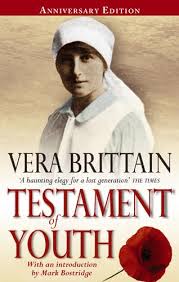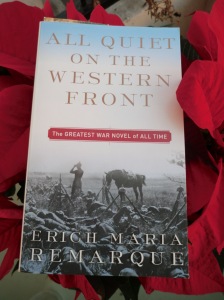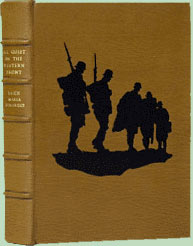 Vera Brittain gave us her Testament of Youth, an account of a generation of youth lost whether they lost their lives or survived World War One, for those who lived, something of the essence of youth was lost to them forever and none who were part of it were unaffected or not changed by it.
Vera Brittain gave us her Testament of Youth, an account of a generation of youth lost whether they lost their lives or survived World War One, for those who lived, something of the essence of youth was lost to them forever and none who were part of it were unaffected or not changed by it.
Earlier in the year Juliet Greenwood gave us a fictional account of woman during World War One in We That Are Left, a novel that highlights the significant changes in the lives of women during that period, to the point of not going back to the way things were.
More recently Richard Flanagan’s Testament of Horrors, which for this reader was more than was possible to absorb, despite the later redeeming passages I may have missed, so visceral were his descriptions.
And now, I add the German Literature classic All Quiet on the Western Front to that tome of war literature that shares something of the experience and its effect, the novel by Erich Maria Remarque telling the story of Paul Baumer, a 20 year old German soldier.
He and his friends are pressured by their schoolmaster to join up early, an action that won’t be forgotten and which will be repaid when they meet again under different circumstances.
“For us lads of eighteen they ought to have been mediators and guides to the world of maturity, the world of work, of duty, of culture, of progress – to the future. We often made fun of them and played jokes on them, but in our hearts we trusted them. The idea of authority, which they represented, was associated in our minds with a greater insight and a more humane wisdom. But the first death we saw shattered this belief. We had to recognise that our generation was more to be trusted than theirs. They surpassed us only in phrases and in cleverness. The first bombardment showed us our mistake, and under it the world as they had taught it to us broke in pieces. ”
 He narrates his journey, their comradeship, their fear, their daily survival. Their small joys often centred around food, their occasional escape, a mild wound or a leave pass and thoughts of how they might ever continue a life other than this if ever there is a peacetime. It is something few can imagine and most don’t want to, it isn’t relevant.
He narrates his journey, their comradeship, their fear, their daily survival. Their small joys often centred around food, their occasional escape, a mild wound or a leave pass and thoughts of how they might ever continue a life other than this if ever there is a peacetime. It is something few can imagine and most don’t want to, it isn’t relevant.
On one of his infrequent visits home, Baumer tries to understand what has changed.
“They talk too much for me. They have worries, aims, desires, that I cannot comprehend. I often sit with one of them in the little beer garden and try to explain to him that this is really the only thing: just to sit quietly, like this. They understand of course, they agree, they may even feel it so too, but only with words, yes that is it – they feel it, but always with only half of themselves, the rest of their being is taken up with other things, they are so divided in themselves that none feels it with his whole essence; I cannot even say myself exactly what I mean.”
The longer war rages, the further away from their past the young men become, they find solace in each other and even begin to miss the front when they are on leave, as they are no longer the youth they were and those that know them now are not here.
The author was himself a German solider who survived the war, became a teacher and a writer, but when in 1933, his works were banned and publicly burned on the initiative of the Nazi propaganda minister, Joseph Goebbels he and his wife left Germany to live in Switzerland. All Quiet on the Western Front had been published at a similar time to Hitler’s Mein Kampf and the two narratives were polar apart. The moment Germany elected Hitler to power, he went after Remarque. Sadly, it was his sister who paid the price, convicted of undermining morality as her brother was beyond reach. She was beheaded in 1943.
I read this on Armistice Day, 11 November, the day that an armistice was signed in France between the Allies and the Germans in 1918, commemorating the end of hostilities in WW1.
Although it is fiction, it reads like a true account. It is a remarkable book, sharing both the physical and mental aspects of youth at war and their slow realisation of its personal consequences.
It is tragic, sad and true and there is an element of hopelessness, that even though we can come to understand what will happen to those affected by war, there is little to be done to prevent it, we as humanity continue to choose it as a method of punishment disguised as a weapon of peace.


I’ve read widely in literature of the First World War and I’ve yet to find a finer novel. As you say, it reads like reality.
LikeLiked by 1 person
The only other war novel that really stood out for me was Bao Ninh’s The Sorrow of War, he was a young veteran of the Vietnam War, perhaps you know the book. I bought it in Hanoi 20 years ago and read it while I was travelling around the country. I listened to him speak here in Aix a few years ago, he never wrote another book and doesn’t consider himself a writer, but he was by far the most compelling person of all the writers in the panel to listen to. There are some who able to channel their experience and see, understand and articulate something more than the reality and we are fortunate indeed that they have decided to share that. Thank you so much for your comment.
LikeLike
Great review, Claire, and how poignant to read this on Armistice Day. I too was struck by how Baumer and his peers were sold down the river by the authority figures of the time: the teachers they trusted, their elders and betters. There’s a universality to the story too, almost as though Baumer could represent any soldier on any battlefield irrespective of nationality. As you say, a remarkable book.
LikeLiked by 1 person
Yes, it was also German Literature month, but I’m a little late in posting. Armistice Day is a public holiday here, so I thought what better way to spend the day than to finally read this wonderful classic and I loved it. I guess that’s not surprising considering Remarque was a pacifist, the reason Hitler hated him so.
I think all young men on both sides of the war were sold down the river, and it was probably worse for those who realised it, those that didn’t could die continuing to believe in loyalty, pride and patriotism.
There is something about youth and war, as if they need it to give their life meaning, just look at all the young men going off to fight terrorism today, they are considered reckless, somewhat ironic.
LikeLike
One to re-read, I think. Is this a new translation? I have only read it in German, and hope the translator does it justice.
LikeLiked by 1 person
Yes, I think it would a good one to reread, it’s not a long book either.
I think this is a reprint, not a new translation. I didn’t have any issues with the translation, clearly it must be good since it continues to be reprinted and especially this year, the anniversary of WW1.
LikeLiked by 1 person
I read All Quiet on the Western Front earlier this year as well as Testament of youth I think they will both be on my best reads of 2014 list. Such beautiful unforgettable writing.
LikeLiked by 1 person
Yes, I remember your wonderful reviews, I am reading along behind you 🙂 I thought Testament of Youth was an astonishingly good read and I can’t wait to see how they treat the film, I am sure that will get many more people reading the book as well.
LikeLiked by 1 person
Beautiful review, Claire. When you referred to Flanagan, I worried a little bit on whether you liked Remarque’s book and whether you were able to finish it. I am glad that you liked it so much. I think it is one of the finest war novels ever written and one of my favourite reads this year. My favourite part of the book was when Paul Baumer talks to that French soldier that he has just shot – it was such a moving and poignant passage. It is sad what happened to Remarque’s sister. It is hard to believe that such things happened not long back.
LikeLiked by 1 person
That was such a moving piece Vishy, I don’t think I could even write about it, it was so touching and sad. I think some of my favourite parts were when they were cooking, feasting and being shot at and unwilling to leave, a kind of temporary haven in among the insanity, creating memorable moments that I am sure they continued to relive often afterwards.
LikeLike
Thanks for this insightful and well-written review, Claire. This will be on my TBR list together with Testament of Youth. Do you know its film adaptation is coming out?
LikeLiked by 1 person
Yes, I heard about it just as I was reading Testament of Youth, in fact I linked to a trailer of the movie at the end of my review, I do hope it’s done well, it has such great potential.
LikeLiked by 1 person
Yes, I remember now I’d seen the trailer from your post. 😉
LikeLike
I was waiting to see how you’d feel about it. One of my favourite books (although almost too painful to reread) about the First World War… and I didn’t know what happened to his sister. How tragic!
LikeLiked by 1 person
I don’t know why, but I didn’t find this anywhere near as hard going as Flanagan’s book. I guess it’s down to the writing, Flanagan has a way of really putting you inside the drama with a vividness that wasn’t offset by the thoughts of Baumer which keep us reading in All Quiet. And there’s a big difference between straight out war on the front line and torture and operating theatres, which are often harder to deal with.
LikeLike
Powerful review. The book really explains what happens to youth because of their war experience. Terrifying.
Sent from my iPad
>
LikeLike
I loved this book, a fine work that shows the effects on soldiers, which is still not heeded today, it is a damning indictment on nations that they still send people into these horrors.
LikeLike
And also Merry Christmas!
LikeLike
War and youth should not be synonymous, but every one of these fine novels emphasizes the connection. Of course it cannot be any other way and I have never read anything that relays this better than All Quiet On The Western Front. It should be required reading in every high school English Lit class. I’m going to look for The Sorrow of War now … thank you for that introduction. If only the world would learn …
LikeLike
Pingback: The Narrow Road to the Deep North by Richard Flanagan – Word by Word